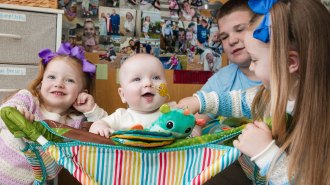Exercise seems to limit bad falls in elderly
Analysis of 17 trials suggests regular activities could stave off injury
Elderly people who maintain a modest program of exercise are less likely to take a bad fall than those who do little physical activity. An analysis of 17 trials finds that people assigned to exercise regularly were substantially less likely to break a bone due to falling.
Falling in old age can be a life-changing event. People who fall are often frail to begin with, and an injury can compound their problems. In people over 75, for example, a broken hip worsens a person’s five-year survival odds dramatically, says Thomas Gill, a geriatrician and epidemiologist at Yale School of Medicine. Such patients rarely return to their pre-fall capabilities, he says.
To gauge the effect of exercise on falling, epidemiologist Fabienne El-Khoury of the University of Paris-South and colleagues identified 17 trials in which people over age 60 who were living independently got randomly designated to exercise or not. None had Parkinson’s or Alzheimer’s disease. The exercises focused on balance training, gait maintenance and muscle strengthening. Fourteen of the studies included group exercise sessions. The studies ranged from several weeks to 18 months in duration.
People who exercised were about two-thirds as likely as those not exercising to have a fall that resulted in a broken bone or other injury, serious or mild, the researchers report October 29 in BMJ.
Many of the studies were small, but together they yielded more than 4,000 participants with an average age of nearly 77. Combining the studies, El-Khoury says, strengthens the evidence and suggests that exercise can have a beneficial effect. Gill calls the finding “promising.”
Meanwhile, a 9,000-person trial in Britain is seeking to sort out differences in fall rates among elderly people, delineating between those getting advice on exercise, getting advice plus exercise or receiving both plus counseling on other risk factors such as dizziness upon standing up or the effects of certain drugs on balance.
El-Khoury says that elderly people are more likely to exercise when a program is pitched “as a way to maintain their independence and well-being” than simply as a way to prevent falls.







